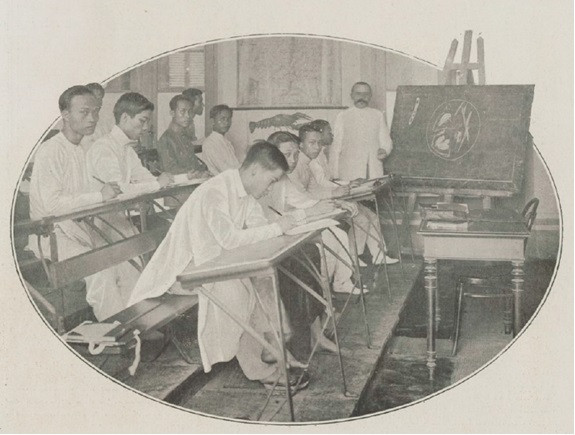 |
The process of introduction, formation, and development of Western medicine in northern Việt Nam from the early 1870s to the mid-20th century is covered in a new book by Bùi Thị Hà, who holds a PhD in history.
Entitled Y tế phương Tây ở Bắc Kỳ (Western Medicine in Tonkin), the book provides an overview of Vietnamese medicine during its early encounter with modern healthcare and scientific knowledge.
It is initiated from Hà’s thesis Y Tế Phương Tây Ở Bắc Kỳ Từ Năm 1873 Đến Năm 1945 (Western Medicine in Tonkin from 1873 to 1945) that she defended in 2019. The thesis earned her a PhD and first prize at the Phạm Thận Duật History Awards. She is working at the Institute of History, Vietnam Academy of Social Sciences.
“It marked the end of five years of initial research on the modern healthcare system in northern Việt Nam. However, it opened up a vast horizon for me to explore the history of healthcare in the country as a whole. There haven't been many studies on this topic in Việt Nam, so I wrote this book as a starting point for further research on the subject of Western medicine in Việt Nam,” Hà told Việt Nam News.
“In particular, my thesis sparked many reflections for me, especially as the country was facing the challenges of a pandemic like COVID-19, which has become a driving force for me to publish this research,” she added.
The topic is a new and challenging one, especially from a historical perspective. To explore new discoveries, the author had to consult original French-language source materials from archival sources not only in Hà Nội and HCM City but also from recent sources in Paris and Aix-en-Provence (France). She also met specialists from the Ministry of Health, Hanoi Medical University, and various healthcare institutions, to understand Western medical concepts.
 |
| A classroom at the Indochina Medical School. Photo: La Dépêche coloniale illustrée |
In the late 19th century, along with the process of colonisation and colonial rule, the French colonialists gradually introduced Western medicine into Tonkin (an exonym referring to the northern region of Việt Nam), establishing and shaping a modern healthcare system here.
According to her findings, the formation of Western medicine brought about major changes to the contemporary medical sector in the region. It established a new healthcare system for Việt Nam, filling important gaps in traditional medicine, especially in terms of how to respond to epidemics.
It also had a positive impact on the social life of the region at that time, primarily by modernising healthcare in terms of disease treatment and epidemic prevention based on scientific experimentation. The local people began to have interest in new issues such as Western medicine, hospitals, vaccines, proper hygiene practices, and disease prevention, which gradually changed their habits and approaches to healthcare.
At the same time, Western medicine contributed to the formation of a Vietnamese medical workforce, including doctors and healthcare personnel. This laid the foundation for the development of Việt Nam’s healthcare human resources in the future.
However, the development of Western medicine in northern Việt Nam during that period also had negative aspects. The essence of humanity in the medical field was politicised and exploited, becoming a tool serving the French colonialist elite in their endeavor of exploitation and colonial rule in northern Việt Nam.
 |
| Bùi Thị Hà, PhD. Photo courtesy of Bùi Thị Hà |
The historian revealed that there were three remarkable points that stand out to her.
“First, the early establishment of Western medicine in the form of the Pasteur Institute in Indochina and the investment in vaccine research and production. This has been a strategic issue in disease prevention up to the present day.
“Second, when Western medicine infiltrated the colony, it could not eliminate traditional medicine but had to accept coexistence. Perhaps this laid the foundation for the emergence of the East-West combined approach in healthcare from the colonial era to the present.
“Third, it is fascinating to see how the Vietnamese people simultaneously fought against the invasion and domination of French colonialists while gradually adopting modern Western medicine,” she said.
In the opening of Western Medicine in Tonkin, Professor Đỗ Quang Hưng from Vietnam National University, Hanoi, wrote: “As someone closely associated with the researcher Bùi Thị Hà, who is now a PhD in History working at the Institute of History, Vietnam Academy of Social Sciences, I have long been eagerly awaiting the publication of this work. After nearly four years, this book has finally been released to readers.
“As the supervisor of the researcher, I am not only pleased but also pleasantly surprised that the book has exceeded the boundaries of a traditional PhD dissertation defended within the academic institution.
“We would like to acknowledge the author's research approach in providing an outline of the history of Western medicine in Tonkin, which serves as an initial foundation for a journey to explore the origins and manifestations of Western medical history throughout Việt Nam over the centuries,” he added.
Western Medicine in Tonkin will be released by Hồ Chí Minh General Publishing House at the end of January. VNS